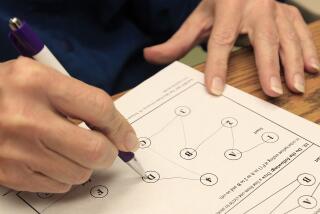The Best and the Brightest Write Letters
In suggesting a list of 10 books every presidential candidate should read, I observed that “no one has ever accused Harding, Coolidge, Hoover, Truman, Eisenhower, Johnson, Nixon, Ford, Carter or Reagan of being an intellectual; nor even the second Roosevelt.”
This gross generalization has provoked much dissent, especially in behalf of Hoover, Carter and Truman.
To begin with, Louise Hauter of La Canada-Flintridge quarrels with my use of the word accused . “Accused means to find fault with, blame, reproach or charge with a crime or other offense,” she argues. “What’s the fault or crime of being an intellectual?”
I used the word accused because, as history shows, to allege that a candidate is an intellectual is almost sure to result in his defeat. As Dick Jones of Long Beach points out, “I don’t think an intellectual, should he or she be foolish enough to run, could get elected. I believe the late Adlai Stevenson proved that.”
I admit that I overlooked the intellect of Herbert Hoover, who is identified by my generation with his helplessness in the Great Depression. Marshall Duell of Claremont notes that Hoover and his wife, Lou, had a large library of ancient books on mining, and translated many texts from Greek and Latin into English. “Hoover claimed that he had read ‘literally thousands of books, giving at least two hours nightly and all spare time on long voyages.’ ”
Robert V. Frampton of Pasadena notes that Hoover and Mrs. Hoover translated a treatise on metallurgy by Agricola, and it is still in print. One of Hoover’s proofs of the Pythagorean theorem was in his 10th-grade geometry book, Frampton recalls. “Hoover might have been a failure as President, but he certainly was not a failure as an intellectual.”
Several admirers of Harry Truman attest to his intellectual accomplishments. “It is certain,” writes Dean Grimes of South Laguna, “that Truman was the most widely read person to live in the White House.”
Grimes notes that Truman’s biographer, Merle Miller, reports that Truman had read all 3,000 books in his home-town library before he entered high school. “He continued to be a voracious reader all his life. He could cite the mistakes made in the Peloponnesian wars, errors made by Napoleon, and the blunders of generals in the Civil War and World War I.”
“Truman was well-informed and intelligent enough to know where the buck stopped,” adds Louise Hauter.
He certainly proved that he knew where the buck stopped when he made the decision to drop the atom bombs on Hiroshima and Nagasaki.
Jimmy Carter also has his advocates. Irmgard Lenel of Santa Monica recalls that Carter read many books every week, mostly highly technical, complicated works. “He had (and presumably still has) a sharp quick mind and a wide-ranging interest.”
“I believe President Carter took time to read many books while in the White House,” writes Judy Sandler of Beverly Hills, “and I’d bet the Bible was at his bedside.”
Meanwhile, Lt. Cmdr. W. J. Hart (USN, ret.) provides an insight into Dwight Eisenhower’s reading tastes. On his pre-inaugural trip to Korea, Ike traveled part-way aboard the U.S. cruiser Helena. “As his party was boarding,” Hart recalls, “it was noted that one of the Secret Service agents was carrying a couple of bundles of what appeared to be magazines. On inquiry, I was informed that they were, in fact, Western pulps.”
Dr. Joseph M. Collier of Huntington Beach suggests that it was John F. Kennedy’s familiarity with Barbara Tuchman’s book, “The Guns of August,” that guided him through the Cuban missile crisis. “Ms. Tuchman reveals how the major powers had backed or forwarded themselves into positions where it seemed impossible for them to save face, and, therefore, they blundered into World War I.” He notes that Robert Kennedy said his brother read the book shortly before the crisis.
Helen Walter asks, “How could even a pseudo-intellectual create a list of American intellectuals and leave out William Buckley?”
First, I do not claim to be even a pseudo-intellectual. Second, there were only three names on my list. Third, I don’t believe Buckley is an intellectual. I think he’s kidding.
Attorney Steve Gourley offers an excellent definition of an intellectual: “An intellectual is someone who can listen to the ‘William Tell’ Overture without thinking of the Lone Ranger.”
Well, that lets out me and Ronald Reagan.
More to Read
Sign up for our Book Club newsletter
Get the latest news, events and more from the Los Angeles Times Book Club, and help us get L.A. reading and talking.
You may occasionally receive promotional content from the Los Angeles Times.






